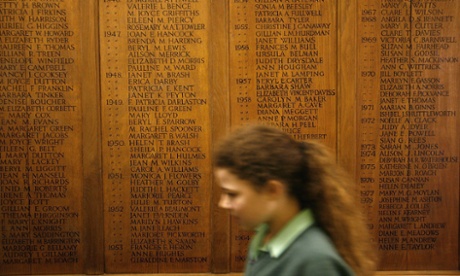
As a housemistress in a boarding school, a huge part of my job is making sure students are cared for when they’re away from their families. I often find myself warning students to wear more clothes or get to bed on time. I am there to talk through everything from exam pressure to cyberbullying, as well as the issues that arise when young people live in such close proximity – it’s a 24/7 job.
I’ve outlined six areas of wellbeing that I’ve learned along the way. Although I work with 13- to 18-year-olds, there are some ideas for all ages of boarding students – feel free to add your tips in the comments section below.
Sleep
The sleep hormone, melatonin, seeps into the teenage brain much later at night than it does for the rest of us. Lack of sleep can make it hard for students to concentrate during the day, so we’ve developed a few ways to help them get enough rest. The lights in the house corridors change to blue in the evenings to encourage quiet and rest, and we have a supply of chamomile tea and lavender oil spray (you’d be surprised by how well this works).
With exams looming, we are running a major campaign on getting enough sleep, telling students the science behind why sleep is so valuable. We did a sleep survey and got students to say whether they were in sleep “credit” or “debt” depending on how they answered the questions. If they were in debt they had to make a plan for getting more rest.
The majority lacked sleep and were surprised by the results. Although some young people weren’t too bothered about being in sleep “debt”, others used the information really positively.
Choose your battles
Every parent has to choose their battles with their children, and it is no different for house staff. For example, when one of our boarders recently disturbed others by not turning out her light at night, we didn’t insist that she did so, but instead bought her a small reading light.
It is important to know when to let go but also when to be consistent. We won’t get too exercised by the colour of hair ties, but we’re strict about work because it’s so important. We have an online system where we can log how much prep is done and if a student says they want to go out for dinner, I can check and see if they’ve finished their work. If they haven’t, I’d say work is more important.
Communication with home
The best relationships between school and students correlate with good communication between school and home. We make sure we update parents and work with them to tackle the important issues.
If a student, for example, is caught smoking or drinking then we’d call parents. We would ask them to talk to their child about it and 99% of the time they will be behind you. I speak to parents every day – about everything from dental appointments to general welfare. We also hold boarding workshops for parents to ensure that everybody is alert to potential problems and helps prevent them.
We encourage students to phone home regularly. They all have mobiles so this should be easy, but if they don’t we have a school phone they can use. Sometimes I tell students who are a bit homesick to phone their parents when they are feeling happy otherwise parents can get the impression that the child is always sobbing.
If students are having a tough time at home and need a shoulder to cry on I offer them a tea and a Jammy Dodger. We also have trained counsellors and a health centre if things are more serious. The student might want to talk about a problem with their favourite teacher, or someone else on site they trust, and that’s fine too.
Home comforts
John Badley, the founder of Bedales, said that a boarding house should be a home, and not a place of work. Consequently, we focus on making sure our houses are modern and comfortable spaces to hang out and cook.
The design is partly down to the students; each house has a strong student council which raises issues and makes suggestions. Our mixed-age dormitories better reflect life beyond the school and for each dorm there are big brother and sister role models to look out for students. None of this precludes fallings out, which can be intense. At such times, staff will encourage the antagonists to speak and listen to each other, and try to facilitate a truce.
Electronic devices
We don’t ban the use of electronic devices because there is no point, but we try to educate our students about the risks. Facebook is limited to evenings, but this is not a unilateral imposition – the decision was reached in consultation with the students.
We’re not oblivious to the fact that kids can find ways around everything. All students are incredibly savvy when it comes to using technology. In PSHE we have special sessions on cyberbullying and internet safety, and our staff are constantly taking courses on these issues.
Staff supporting each other
When students experience problems it is good for staff to know we have each other for support. We look at past experiences and unpick each situation to make sure we are fair and consistent in our response. The work is demanding, and a formal weekly forum allows us to seek help if we are struggling. Less formally, staff meet to chat, although support might also be a phone call or a timely pat on the shoulder.
Bedales is holding a conference in May for pastoral staff and students looking at wellbeing issues. Find out more here.
The Working in Independent Schools series is funded by the IAPS. All content is editorially independent except for pieces labelled “brought to you by”. Find out more here.

